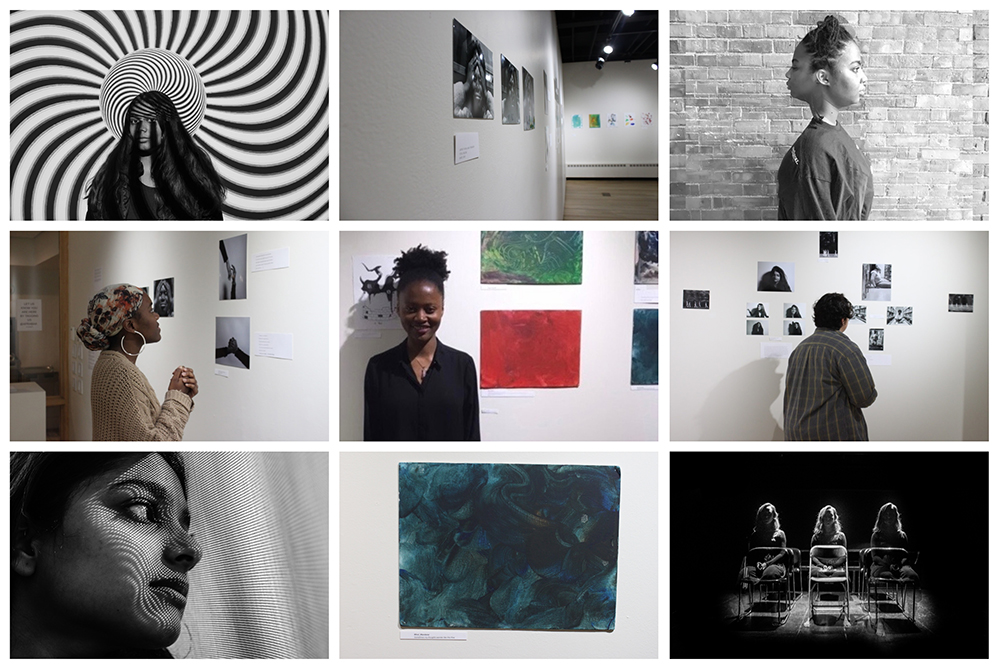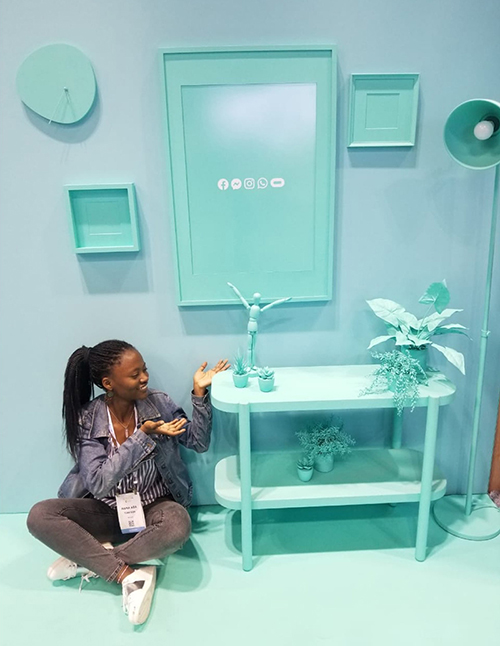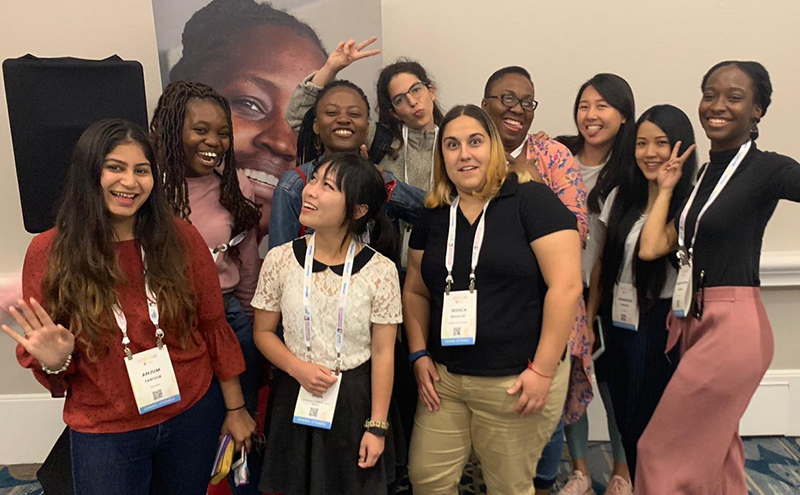Windows Insider article published on Jun 29, 2020

Nana Aba Aprewa Turkson is a young woman of seemingly endless talents, and she’s using them to change the world.
She’s a Windows Insider, winner of our 2019 Grace Hopper Award, and a student at Mount Holyoke College. She’s a computer scientist and coder, exploring how robotics can change the future of medical research. She’s an artist and mental health advocate. She’s a mentor, teacher, and community leader.
And as she’ll happily tell you, everyone can pursue these kinds of goals with tech.
Finding her passion
Her passion for computer science all started with a robotics competition. “I barely had any experience in coding or building robots. Luckily, I found myself in a situation where I had no other choice than to do something and get outside of my comfort zone,” she said. “My team was an all-female one, and so I felt we were a representation for women in tech. Everything we did then really mattered!”
As they stepped up to make sense of the project they were assigned, she realized just how much she enjoyed the creative process.
“The inner excitement I felt when I found out how to create the color sorter, or the self-driving car, or even when my first code for the self-driving car complied. That was such an amazing feeling.”
After that, she knew she wanted to study computer science.
In college, she just fell more in love with technology as it expanded her creativity and let her challenge herself. “Computer science opened avenues for me to be able to see the impact of what I have created and work on making it better and able to serve other people as well.”
As a coder, she’s used Java to make a game where you guess movies from a hidden movie list, called The Guessing Game. She’s used V-REP to control a humanoid robot’s movement and Pypot to make it back-flip and dance. Along with a friend, she’s used JavaScript to create a database of participants in a Scripture Union Camp and then automatically sort them into houses. She took a privacy class and wrote an article on differential privacy. She’s trained an AI model using PyTorch and Fashion-MINIST datasets so it can identify types of clothing.
But Nana has bigger, more personal dreams still.
Researching malaria
Years ago, Nana Aba lost her brother to malaria. Now, she’s using robotics to try to help us better understand malaria and save lives.
Malaria is a deadly disease that had 228 million cases and 405,000 deaths in 2018, many of them children in Africa, according to the World Health Organization (WHO). WHO’s research agenda for eliminating malaria points out that the strains of parasites that cause malaria have continued to evolve, which has posed new research and treatment challenges.
“I believe that we can use this field, together with other areas in artificial intelligence and biomedical sciences, to combat the parasites ever-involving nature,” she said.
Nana Aba’s been researching the disease and the technology she needs to make it happen since 2017. “This research has progressed from an idea to learning so much about the malaria disease and malaria parasites, into learning the field of soft robots, taking online classes to understand machine learning, having conversations with masters’ degree students who are also researching either the Plasmodium falciparum parasite or the disease in general, reading papers from other researchers, listening to podcasts, and even writing down my thoughts,” she said.
An independent advisor has also been helping her connect with other leaders in soft robotics and AI, so she can start creating the device.
“I want to create something that will put an end to malaria mortality and morbidity. This win will be for my brother and for a better world.”
Creating acceptance
It’s no surprise that with how creative she is, Nana Aba is also an artist. Her recent art exhibition used abstract painting and photography to shed light on mental health.
“The “I AM” art exhibition was held in November because it used to be a season where I was at my lowest,” she said. “But on that day, I was better, better than I have ever been. This show was a way of remembering my struggle and being thankful, especially to God.”
For her, it was a chance to not only share her thoughts and feelings about battling depression and suicidal thoughts but also to hear from others. She included a timeslot specifically so visitors could share their own stories and be heard.
“I wanted people that go through mental health issues to know that it is okay not to be okay sometimes, okay to battle with their mental health and that they are not alone,” she said.

You can follow her on Apraba to see more of her artwork.
Leading the way
With all these accomplishments, it was a pleasure to invite Nana Aba to join us at the Grace Hopper Celebration in 2019. While she joined 25,000 other women in tech from around the world to be inspired, connected with Mollie Jain, her mentor from Microsoft and made lasting bonds with the other winners, the most memorable moment of the event for her was a meal together.

All of the Grace Hopper Award winners and women from Microsoft and tech came together to share their experiences and stories over dinner. “Being in that circle, that space at the same time, hearing these amazing women share their knowledge in the field of technology, their life lessons, and so willing to help you out in any way that they could, that was a defining moment for me at that conference,” she said.
“It reminded me of the power of being surrounded by people that are in the tech field, people that understand your struggle, and are willing to help you, and it also reminded me of why I am here.”

The event was so inspirational that Nana Aba would like to create a version for Africa, that brings together African women in tech and connects them with opportunities from around the world. And with the community she’s built through years of service in Africa and her home, Ghana, this isn’t an unrealistic goal.
Nana works with Code Afrique, an organization that gives African students a window into the world of computer science and technology and works to break the stereotypes that medicine and research are the only career paths available to science-lovers.
Last winter, she joined Code Afrique in Ghana and had the chance to return to her school, the Yaa Asantewaa Girls’ Senior High School in Kumasi. “I was excited to go back to my high school and encourage the girls to participate in this great opportunity, where they could learn how to code and compete in the hackathon,” she said.

Nana’s proud that she can be someone for these girls to look up to. “I did not have a female computer science mentor teach me how to code whenever I participated in tech competitions in high school, and so I was glad that I was who I wished I had,” she said.
Since then, she started mentoring a student from Kenya who was frustrated with her intro to C++ class. “I wanted her to know that I understood her frustration. Being frustrated is a part of the coding journey but the end, compiling the code and successfully running the program, will be worthwhile,” she said. “Just like any other work, you have to be willing to put in the work if it does not come so quickly to you, and if you do, it will pay off.”
She believes harnessing technology the same ways other parts of the world already have, for digital transactions with money, data, and processing, creating efficient accountability systems for public organizations, and improving basic infrastructure, can make a difference in her community and Africa as a whole.
She hopes to be a leader in the field in the future, helping drive important changes like these. Most of all, she’d like to help women innovate, invent, and create more. She also wants to change the face of malaria research, create web and mobile applications, establish an all-women engineering and architecture school in Ghana, and work with women on a new OS, that values their unique viewpoint.
“I noticed that men created most of the operating systems that exist, and I want to change that,” she said. “Every woman possesses traits or specialties that are unique to themselves, and this has a tendency to present a unique front in the STEM field that might be missed if we are not part of the developmental stages.”
This passion is one of the reasons she’s a Windows Insider. “As an Insider, I get to be a part of a community that contributes and shapes the next evolution of Windows,” she said. “It is also an opportunity to learn how to maintain the Windows OS, which is something I will need when creating another OS with a group of women.”
All of these experiences and challenges have shaped Nana Aba into the leader she is today. “I am not only a woman, I am Ghanaian, African, Black, low-income, a part of a minority, and a Turkson,” she said. “I do not live just for myself, but for all the people that share my identities and understand what it is to be a minority and away from home.”
“It is so important for me to become the woman in tech that I wish I had in my time to look up to. And that woman, that is an inventor, engineer, innovator, confident, taking up spaces, breaking the status quo, inspiring her generation and the next, and lastly continuing to use her knowledge, networks, and resources to uplift others, especially people from home, Ghana,” Nana Aba said. “I am proud that each day, I am becoming that woman.”
Original full design:

